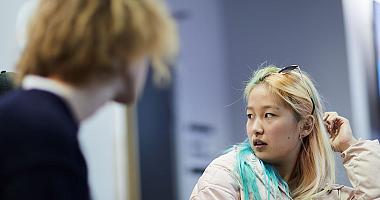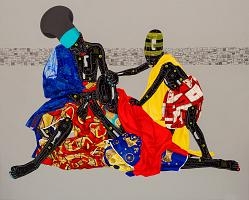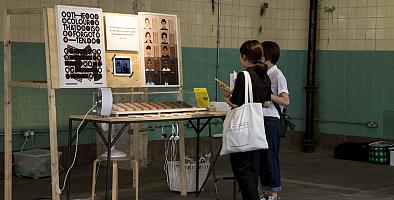MA
Media and Communications
Content navigation menu
Why study MA Media and Communications at Goldsmiths
For over 30 years this MA has been actively interrogating the way the mediated world works. Discover the many roles of media and communications in your life and identity, across institutions and organisations and into wider cultures and societies through this pioneering programme.
- The Department of Media, Communications and Cultural Studies has been ranked second in the UK for 'world-leading or internationally excellent' research (Research Excellence Framework, 2021) and 16th in the world (third in the UK) in the 2024 QS World Rankings for communication and media studies.
- There has never been a more exciting time to study media and communications. The digital age has transformed our experiences from shopping, to chatting to friends, to searching out information, to political activism. Our mediated worlds impact upon the rhythms and rituals of our daily lives changing the way we think about things, the way we create things, even the way we conceive of ourselves.
- We are deeply entangled with media, in all their forms; One of our core concerns on this Masters is to work out what the role media play in the ways we live together – to provide a critical appraisal of our mediated existences. What does it mean to live in a digital age?
- Challenging assumptions is at the core of this course. We want rich, complex answers formed through theoretical and empirical work. To get to these we ask demanding questions. What happens to personal relationships in digital media environments? How do people affected by disasters use social media and other media to recover? How do the media influence our lives as citizens and our own (as well as others) political decisions? What should be the future of public service broadcasting? Do social media enable new forms of protest and political action?
- Together we look at these kinds of issues to establish how the media are implicated in different aspects of life and the way the world functions.
- We encourage you to look at issues holistically. Alongside lectures and seminars we run workshops, screenings and cultural trips to encourage you to explore the role of the media in our lives as widely as possible – from the individual and organisational level to corporations, the state, and the market across both the public and private sectors.
- This is a theory-driven MA, but you also have the opportunity to do a practice option in a range of areas including journalism, campaigns and design, and the Screen School. Plus you get the chance to apply your knowledge to a subject that ignites your interest and do your own independent research as part of your dissertation. From how people mediate the self through body piercing to how we form intimate relationships through social media, your dissertation topic is entirely up to you.
- Every year we’re changing the content to relate to existing issues so we’ll always be working on what’s current. We take a collaborative approach, bringing in many different intellectual ideas and calling upon a whole range of ways of thinking which have been traditionally compartmentalised.
Contact the department
If you have specific questions about the degree, contact Professor Lisa Blackman.
Length
1 year full-time or 2 years part-time
Entry requirements
You should have (or expect to be awarded) an undergraduate degree of at least 2:1 standard in a relevant/related subject. You might also be considered if you have relevant experience and can show that you have the ability to work at postgraduate level.
Fees
Home - full-time: £11170
Home - part-time: £5585
International - full-time: £20460
Department
What you'll study
You will take one core module, which will introduce you to media and communications theory, and will enable you to develop and explore interdisciplinary perspectives on the study of contemporary processes of mediation.
| Module title | Credits |
|---|---|
| Introduction to Media and Communications Theory | 30 credits |
You also choose optional modules worth 90 credits, at least 60 of which must be from the list offered by the Department of Media, Communications and Cultural Studies.
You will also complete a dissertation based on independent research, which is supported by a module in research skills training.
In addition to the required core and option modules, a strong emphasis is placed on student participation in the research culture of the department and College.
Note about optional modules (if available): The above is indicative of the typical modules offered, but is not intended to be construed or relied on as a definitive list of what might be available in any given year. The module content and availability is subject to change.
Assessment
The MA is assessed primarily through coursework essays and written projects. Practical modules may require audiovisual elements to be submitted. It will also include a dissertation of approximately 12,000 words.
Entry requirements
You should have (or expect to be awarded) an undergraduate degree of at least upper second class standard in a relevant/related subject.
You might also be considered if you aren’t a graduate or your degree is in an unrelated field, but have relevant experience and can show that you have the ability to work at postgraduate level.
International qualifications
We accept a wide range of international qualifications. Find out more about the qualifications we accept from around the world.
If English isn’t your first language, you will need an IELTS score (or equivalent English language qualification) of 6.5 with a 6.5 in writing and no element lower than 6.0 to study this programme.
If you need assistance with your English language, we offer a range of courses that can help prepare you for postgraduate-level study.
How to apply
Apply directly to Goldsmiths using our online application system
You apply directly to Goldsmiths using our online application system.
Before submitting your application you’ll need to have:
- Details of your academic qualifications
- The email address of your referee who we can request a reference from, or alternatively a copy of your academic reference
- Copies of your educational transcripts or certificates
- A personal statement – this can either be uploaded as a Word Document or PDF, or completed online. Please see our guidance on writing a postgraduate statement
You'll be able to save your progress at any point and return to your application by logging in using your username/email and password.
When to apply
We accept applications from October for students wanting to start the following September.
We encourage you to complete your application as early as possible, even if you haven't finished your current programme of study. It's very common to be offered a place that is conditional on you achieving a particular qualification.
Late applications will only be considered if there are spaces available.
If you're applying for funding, you may be subject to an earlier application deadline.
Selection process
Admission to many programmes is by interview, unless you live outside the UK. Occasionally, we'll make candidates an offer of a place on the basis of their application and qualifications alone.
Find out more about applying.
Fees and funding
Annual tuition fees
These are the PG fees for students starting their programme in the 2024/2025 academic year.
- Home - full-time: £11170
- Home - part-time: £5585
- International - full-time: £20460
If your fees are not listed here, please check our postgraduate fees guidance or contact the Fees Office, who can also advise you about how to pay your fees.
It’s not currently possible for international students to study part-time under a student visa. If you think you might be eligible to study part-time while being on another visa type, please contact our Admissions Team for more information.
If you are looking to pay your fees please see our guide to making a payment.
Funding opportunities
Football Writers Association (FWA) Bursary
The aim of the FWA Bursary is to encourage those students who come from backgrounds that are underrepresented in the industry.
Use the Goldsmiths scholarships finder below to find out what other funding you may be eligible for.
Paying your fees
Find out about paying your tuition fees.
If you are a UK student you may be eligible for a postgraduate loan.
Meanwhile our Careers Service can also offer advice on finding work during your studies.
Additional costs
In addition to your tuition fees, you'll be responsible for any additional costs associated with your course, such as buying stationery and paying for photocopying. You can find out more about what you need to budget for on our study costs page.
There may also be specific additional costs associated with your programme. This can include things like paying for field trips or specialist materials for your assignments. Please check the programme specification for more information.
Careers
The Department has a strong record of employment prospects for its graduates and has established strong links with the creative industries in London and beyond.
We have a significant number of international students on the MA Media and Communications, some of whom come to the programme by arrangement with their employer in their home countries, and return to their jobs on completion. A number are seeking professional development and a career change, or are updating their skills and expertise in the fields of media and communications in order to enhance their role and to contribute to the innovation and development of the media, creative and cultural industries in their home countries.
A number of students, depending on visa arrangements, elect to stay in London and seek work in the media industries.
Some students set up their own businesses in the fields of media and communications and have helped to innovate the field and the future of media. A small group from each annual intake go on to do further academic research, such as a PhD.
Many of our graduates also move into research to apply the rigour of theoretical study to problems they encounter in their everyday lives.
Graduates from this degree go into:
- Advertising
- Marketing and public relations
- Broadcasting and print media
- Social media
- NGOs and intergovernmental organisations
- The arts and heritage sector
- Digital media and communications heads/managers across a variety of sectors





